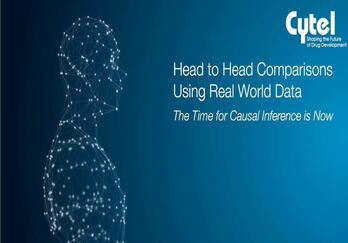Head to Head Comparisons Using Real World Data

Cytel is conducting a webinar series that focuses on target trial emulation and causal inference approaches using real world data. In collaboration with Dr. Miguel Hernán, Professor at Harvard University, Cytel is pioneering two “Head-to-Head Comparisons using Real World Data” studies, one in oncology one and in cardiovascular disease. These projects will occur in real time across this webinar series. Our presenters for the first webinar in this series were Dr. Miguel Hernán and Devon Boyne, Director of Epidemiology at Cytel. Continue reading this blog for a summary of the webinar, “Head to Head Comparisons Using Real World Data - The Time for Causal Inference is Now” conducted on July 7, 2020. Click on the button to access the webinar replay.
We also had the opportunity to interview Dr. Hernan on head-to-head comparisons. Read the interview here.
Some questions touched upon in the webinar include the following:
What is Causal Inference and Why Do We Need it for Decision-Making?
Causal inference is a complex scientific task that relies on triangulating evidence from multiple sources and on the application of a variety of methodological approaches. * It is what we do to learn what works and what harms. In clinical research, decision makers use causal inference to choose among different courses of action. We can compare the outcomes under these said different courses of action as well as compare the effectiveness and safety. One way to learn what works is by conducting randomized trials. But conducting these trials is difficult as they are expensive, sometimes unethical, and often impractical and untimely. As deferring decisions is not an option, we resort to analyzing observational data.
What is a Target Trial?
For each observational analysis for causal inference, we can imagine a hypothetical randomized trial that we would prefer to conduct. We refer to such trials as Target Trials. A Target trial is the hypothetical randomized trial that we would like to conduct to answer a causal question. A causal analysis of observational data can be viewed as an attempt to emulate some target trial. If we cannot explain what our target trial is then chances are that our causal question is not well-defined.
What is the relationship between a Target Trial and an Estimand?
The Target Trial concept is based on two very simple steps. One, ask a causal question and two, answer the causal question. This needs to occur anyway when clearly defining an estimand. If we can specify the protocol of the target trial, then we would exactly know what our causal question is. Every time we are using observational data to try to answer a causal question, the first step is to design a randomized trial and then analyze the observational data. There are two approaches we can take to answer a causal question. We can either conduct the target trial or use observational data to explicitly emulate the target trial. Dr. Hernan uses two examples both of which show failure of data.
The second half of the presentation is led by Devon and is about the pilot projects Cytel has undertaken in collaboration with Dr. Hernan. Watch the recording of webinar by clicking on the button.
*https://cdn1.sph.harvard.edu/wpcontent/uploads/sites/1268/2020/02/ci_hernanrobins_21feb20.pdf
The next webinar in this series is going to briefly outline the concept of head to head comparison using RWD and present the design of the cardiovascular pilot investigation. The speakers will also discuss the data requirements and the data source to be used in the pilot investigation with the focus on how to assess if data are sufficient for the purposes of trial emulation. Register now.
Head to Head Comparisons Using Real World Data - Design and Datasource Considerations from Pilot Investigations in CVD
July 28, 2020 8am (PST) | 11am (EDT) | 5pm (CET)
About the Speakers
Miguel Hernán, MD, DrPH, Professor, Harvard University
Miguel Hernán conducts research to learn what works for the treatment and prevention of cancer, cardiovascular disease, and HIV infection. Together with his collaborators, he designs analyses of healthcare databases, epidemiologic studies, and randomized trials. Miguel teaches clinical data science at the Harvard Medical School, clinical epidemiology at the Harvard-MIT Division of Health Sciences and Technology, and causal inference methodology at the Harvard T.H. Chan School of Public Health, where he is the Kolokotrones Professor of Biostatistics and Epidemiology. His edX course Causal Diagrams and his book Causal Inference, co authored with James Robins, are freely available online and widely used for the training of researchers.
Devon Boyne, PhD Candidate, Director of Epidemiology, Cytel
Devon Boyne is a Director of Epidemiology at Cytel. He is a PhD Candidate in Epidemiology in the Department of Community Health Sciences at the University of Calgary and holds an M.Sc. in Epidemiology from Queen’s University and a Certificate in Data Analysis from the SAS Institute. His research interests include the emulation of target trials using real-world evidence, the development and assessment of clinical prediction models, and methods for conducting indirect treatment comparisons and network meta-analysis. Outside of his research, Devon has helped to teach numerous graduate-level courses in epidemiology and statistics and continues to attend workshops in advanced analytic techniques such as g-methods, multistate models, mixture models, and quantitative bias analysis.



